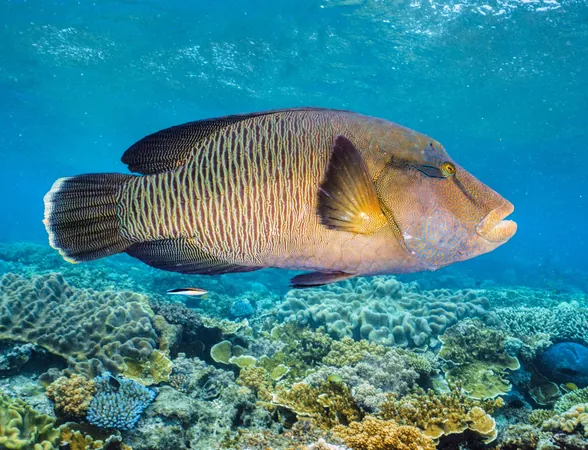
Breakthrough Study Reveals Fish as Tool Users – A New Era of Aquatic Intelligence!
2025-03-31
Author: Wei Ling
Introduction
For a long time, the concept of tool use was primarily reserved for humanity and a few select animal species such as primates and crows. However, recent research has dramatically shifted that narrative by uncovering astonishing evidence of tool use among fish, particularly certain wrasse species.
Groundbreaking Study
Dr. Juliette Tariel-Adam from Macquarie University has led a groundbreaking study that has documented various species of wrasse adeptly using hard surfaces to crack open their prey. This unprecedented behavior, previously overlooked or underestimated in the aquatic realm, pushes cognitive boundaries and challenges our understanding of intelligence in non-mammalian species.
Unique Skill of Wrasses
Wrasses, which are vibrant, colorful fish found in warm waters globally, display a unique skill known as "anvil use." This involves picking up crabs, mollusks, and brittle stars, then skillfully smashing them against rocks or coral to access their food, showcasing a remarkable level of intentionality in their actions. The newly documented behaviors illustrate that these fish do not act randomly but instead show targeted, practiced movements, all aimed at consuming their hard-shelled prey.
Significant Findings
The study identified 16 instances of tool use across five species in the New World Halichoeres group, with three species exhibiting this behavior for the first time ever! This discovery not only highlights the cognitive abilities of fish but also hints at the potential for further, undiscovered tool-using behaviors among marine species.
Community Science Project
This revelation resulted from a collaborative effort initiated by a community science project dubbed "Fish Tool Use." Researchers engaged with divers and marine hobbyists across locations such as Brazil, Colombia, and the Turks and Caicos Islands, gathering valuable footage and observations that have broadened our understanding of these intelligent fish.
Lack of Laterality in Tool Use
An intriguing aspect of this study was the wrasses' lack of laterality in tool use. Unlike many primates and birds that often favor one side, wrasses exhibited equal proficiency with both sides of their bodies, allowing them to adapt easily to varying conditions underwater. This flexibility is a significant advantage, enabling them to utilize various surfaces without being constrained by preference.
Adaptability in Tool Use
Moreover, the study observed that wrasses can perform their tool-using behaviors on several types of anvils, including rocks, coral, rubble, and even live conch shells. This adaptability further underscores their cognitive flexibility and environmental awareness, indicating that these fish are not merely reacting to their surroundings but actively interacting with them in strategic ways.
Challenges Faced
However, the energy exerted to break open prey comes at a cost. The wrasses sometimes struggle with their grip, requiring them to readjust their position or risk losing their hard-earned meal. Predation and competition add to the stakes; nearby fish often attempt to snatch the wrasses' food, introducing an element of danger to their innovative feeding strategy.
Broad Implications
This study has broad implications for our understanding of animal cognition. Fish can no longer be viewed as simplistic creatures. Their ability to use tools places them alongside other innovative animals such as octopuses, wasps, and various bird species, leading to questions about what other intelligence-driven behaviors may exist across the animal kingdom.
Future Research Directions
As researchers explore further into this emerging field, they hope to gather more data. Controlled studies could yield deeper insights and help pinpoint the specific environmental or evolutionary pressures that fostered this tool-using behavior among wrasses and possibly other fish.
Conclusion
In conclusion, the evidence reveals that our perceptions of intelligence and adaptability in aquatic life have been sorely underestimated. As researchers continue to uncover more about fish cognition, it becomes increasingly clear: the ocean is home to a vast array of intelligent beings capable of innovative thinking. The study’s findings, published in the renowned journal Coral Reefs, mark a significant advancement in our understanding of aquatic life, hinting that tool use might be more widespread in the fish world than we previously imagined. Keep an eye on the waters – more groundbreaking discoveries are sure to come!


 Brasil (PT)
Brasil (PT)
 Canada (EN)
Canada (EN)
 Chile (ES)
Chile (ES)
 Česko (CS)
Česko (CS)
 대한민국 (KO)
대한민국 (KO)
 España (ES)
España (ES)
 France (FR)
France (FR)
 Hong Kong (EN)
Hong Kong (EN)
 Italia (IT)
Italia (IT)
 日本 (JA)
日本 (JA)
 Magyarország (HU)
Magyarország (HU)
 Norge (NO)
Norge (NO)
 Polska (PL)
Polska (PL)
 Schweiz (DE)
Schweiz (DE)
 Singapore (EN)
Singapore (EN)
 Sverige (SV)
Sverige (SV)
 Suomi (FI)
Suomi (FI)
 Türkiye (TR)
Türkiye (TR)
 الإمارات العربية المتحدة (AR)
الإمارات العربية المتحدة (AR)